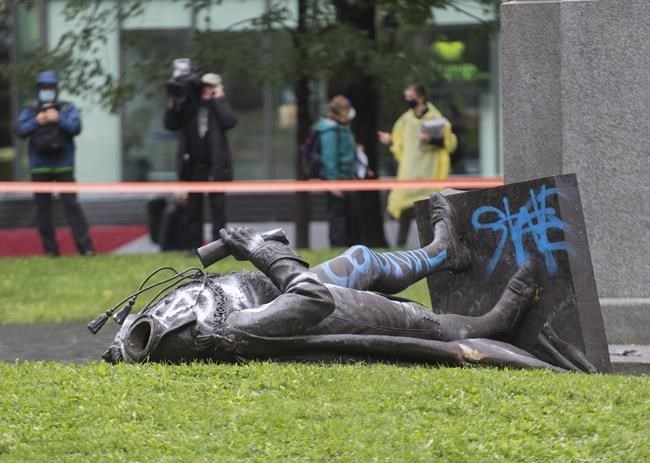MONTREAL — The City of Montreal announced Wednesday that it won't put back a downtown statue of Canada's first prime minister that was toppled and beheaded three years ago by protesters.
Sir John A. Macdonald is considered the architect of Confederation -- but also of the residential school system -- and the city says it plans to partner with a local institution, such as a museum, to display his bronzed image in a different location with more contextual information for onlookers.
Montreal won't return the statue, city councillor Ericka Alneus told reporters Wednesday, "not with the aim of erasing history, but with the aim of confronting it with the values and concerns of our time."
Erected in 1895, the prominent statue of Macdonald, who championed the assimilation of Indigenous people, was frequently the target of vandalism before protesters tore it down from its pedestal in downtown Montreal's Place du Canada on Aug. 29, 2020.
Since then, the statue has remained in storage while the city considered its future, commissioning a group of historians, academics and other experts to evaluate possibilities.
On Wednesday, Montreal's executive committee accepted that group's final recommendations, including the restoration of the statue — decapitated from its fall — and its eventual placement in another, publicly accessible space with new interpretive elements, such as additional artwork or virtual markers. The unveiling of the reimagined monument is scheduled for sometime in 2025.
The now-empty pedestal will remain in Place du Canada as a reminder of the statue's history, the city says, with an updated plaque, to be installed in October, explaining Macdonald's legacy, and new artwork at the site by the end of September 2024.
Alneus said the city is not considering removing other controversial public monuments. Nor, Alneus added, would further acts of vandalism trigger studies on those monuments' futures.
The city councillor also recognized that the city's decision not to return the Macdonald statue may be controversial. Among those who gave it a cool reception on Wednesday was Quebec Minister of Culture and Communications Mathieu Lacombe.
"Our government's position is very clear: we must not rewrite history," he told reporters.
Lacombe stopped short of saying the statue should return to its original location but asserted, "we have to live with this history, for better or for worse."
Alneus shot back at the suggestion without addressing Lacombe directly. "I don't think we're erasing. I think we're making sure that history is complete," she stated.
"We're comfortable and we accept (the) reality" that not everyone will agree with the decision, she said. "I can understand that some people might feel not comfortable with what we're doing. That's part of life."
The director of the Native Women's Shelter of Montreal, meanwhile, questioned the rationale of making the statue accessible to the public in another location instead of simply discarding it.
"I don't know why we have to glorify people that have done harm...that continues on from one generation to another," Na'kuset said Wednesday in a phone interview.
"I don't understand it at all."
Montreal executive committee member Alia Hassan-Cournol, whose responsibilities include reconciliation with Indigenous peoples, said Indigenous experts have been involved in crafting the plan for the statue. The city will also collaborate with Indigenous community members on the content of the new plaque in Place du Canada, she said. In a meeting on Wednesday, the executive committee also raised the possibility of holding Indigenous ceremonies in the downtown square.
Na'kuset, who uses only one name, said she hopes the city's consultations with Indigenous groups are robust and meaningful.
In the meantime, she said, "I don't have my pompoms going, 'Yay city!'"
This report by The Canadian Press was first published Aug. 30, 2023.
— With files from Pierre Saint-Arnaud in Montreal.
Thomas MacDonald, The Canadian Press




